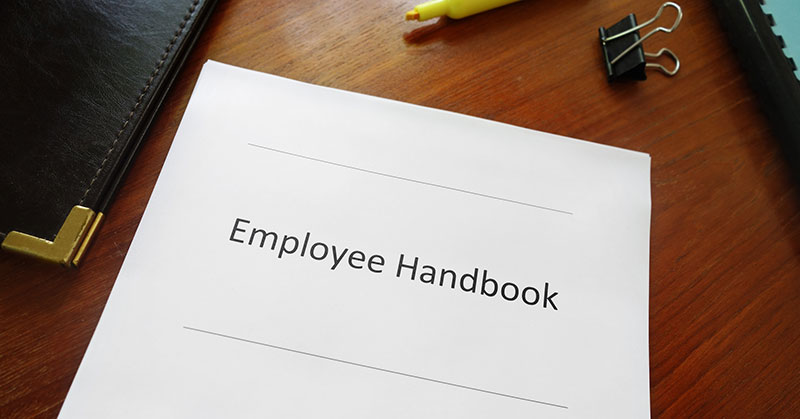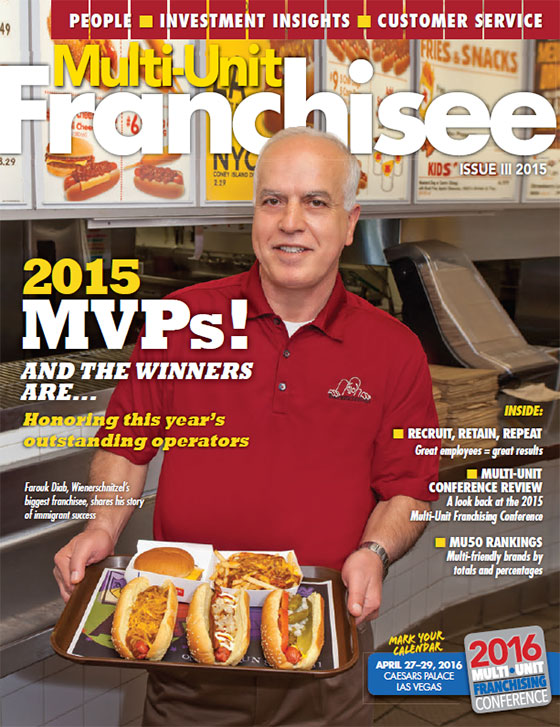What State Is Your Employee Handbook In?

One size does not fit all in today's environment
This column looks into the use of employee handbooks by multi-unit franchisees, particularly those originally drafted by the franchisor or by a third party operating in a different state from the franchisee's territory.
I begin by exploring the definition of "employer of record"--and how it can help shape expectations for a multi-unit franchisee, specifically relating to employer liability in an evolving regulatory landscape. Second, I summarize the rationale for why employee handbooks should come directly from the employer of record. Third, I offer a recommendation that could help mitigate potential vicarious employer liability and minimize the risks of future claims that parties acted as joint employers.
First, a definition of employer of record: the entity responsible for the payment of wages to employees; for all payroll taxes to local, state, and federal governments; for maintaining right of direction and administrative control over employees; and liable for full compliance with all local, state, and federal governments as the source of the wage. In this context, "right of direction" includes the rules and guidance from the employer over the work site, i.e., the employee handbook.
The franchisor is not the employer of record. The consultant is not the employer of record. Nor is the payroll data processor that may provide potentially helpful HR tools, templates, or guidance. The franchisee is the liable employer of record and must provide the employee handbook specific to their territory, in full compliance with their corresponding local and state government regulations. Based on this understanding, multi-unit franchisees must be careful when managing such responsibilities under their own federal employee identification numbers (FEINs), while rightfully acknowledging that all such facets of these responsibilities (whether in-house or outsourced) are non-revenue generating.
Since the employer of record is the liable party, it should be the source of the employee handbook. A review of more than 12 multi-unit owners in both "employer friendly" and "employee friendly" states found alarming results. Most alarmingly, the majority of multi-unit franchisees were operating with employee handbooks originally drafted by either their franchisor or by a third party operating in a different state from the franchisee's territory, and which contained inapplicable and/or inaccurate statements that complicated attempts to settle grievances with employees or ex-employees. For example, if the multi-unit franchisee was operating in Texas, their employee handbook came from a franchisor based in Canada. If the multi-unit franchisee was in California, their employee handbook came from a payroll data processing service based in Florida.
Many multi-unit franchisees learned late that their employee handbook contained state laws that did not apply to their territory. Such discrepancies can lead to problems, such as an increased probability of vicarious employer liability claims. Risks to franchisees of vicarious employer liability and misguided claims of being a joint employer with the franchisor can be mitigated when the direct management of human capital is handled properly. Such details are consistent with recent concerns expressed by the NLRB.
Given the evolving political and regulatory landscape, a franchisor that continues to distribute a one-size-fits-all employee handbook, or that provides guidance of any kind on the direct management of human capital involving any facet of the employer-employee relationship, can invite additional scrutiny and arguments, including but not limited to claims they acted as a joint employer and consequently, should be liable.
Times have changed
Our research shows that the one-size-fits-all approach to the employee handbook and to providing guidance on the direct management of human capital from any party other than the employer of record is over. Further, it suggests that the one-size-fits-all approach to any facet regarding the direct management of human capital can harm the franchisee (an independent business entity and employer of record) by mandating that it abide by specific and potentially inapplicable and/or inaccurate labor relations standards from another independent entity (who is not the employer of record.)
Therefore, to best mitigate potential vicarious employer liability and minimize the risk of receiving future claims that such parties acted as joint employers, our research suggests that the employee handbook should not come from anyone other than the employer of record.
For those multi-unit franchisees who are not comfortable with managing this kind of liability on their own under their own FEIN as the employer of record, our recommendation is that they can, and should, outsource part of this responsibility to a professional employer organization (PEO) specializing in franchising. The PEO will then act as the employer of record on behalf of the client (the franchisee) under its own FEIN, thereby providing an arguable shield of employer liability. (This should not be confused with payroll data processing services that may provide potential helpful HR tools, templates, or guidance but that do not take on the responsibility of being the employer of record.)
A final note: HR cases involving multi-unit franchisee labor relations should not be confused with the franchisor's rightful management and enforcement of uniform brand standards. While one size does not fit all for human capital management, this should not be confused with maintaining uniform brand standards.
Daniel Mormino is division vice president of InfinitHR, a professional employer organization. Contact him at 623-455-6234 or [email protected].
Share this Feature
Recommended Reading:
FRANCHISE TOPICS
- Multi-Unit Franchising
- Get Started in Franchising
- Franchise Growth
- Franchise Operations
- Open New Units
- Franchise Leadership
- Franchise Marketing
- Technology
- Franchise Law
- Franchise Awards
- Franchise Rankings
- Franchise Trends
- Franchise Development
- Featured Franchise Stories
FEATURED IN

Multi-Unit Franchisee Magazine: Issue 3, 2015

$250,000
$150,000





 The multi-unit franchise opportunities listed above are not related to or endorsed by Multi-Unit Franchisee or Franchise Update Media Group. We are not engaged in, supporting, or endorsing any specific franchise, business opportunity, company or individual. No statement in this site is to be construed as a recommendation. We encourage prospective franchise buyers to perform extensive due diligence when considering a franchise opportunity.
The multi-unit franchise opportunities listed above are not related to or endorsed by Multi-Unit Franchisee or Franchise Update Media Group. We are not engaged in, supporting, or endorsing any specific franchise, business opportunity, company or individual. No statement in this site is to be construed as a recommendation. We encourage prospective franchise buyers to perform extensive due diligence when considering a franchise opportunity.